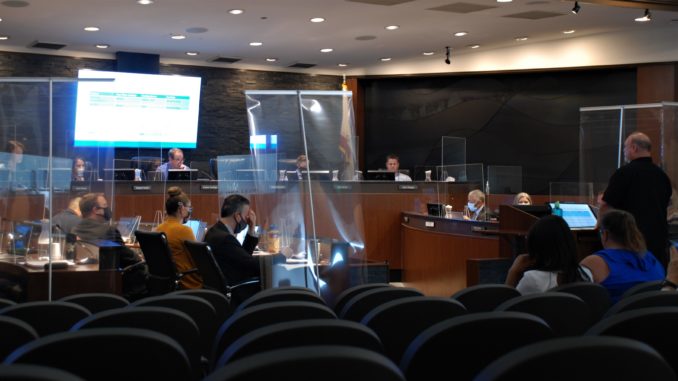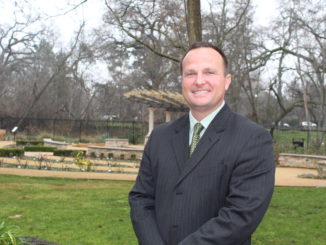
When homeless advocate Kelli Johnson addressed the Chico City Council during its meeting Tuesday night (June 15), she spoke as heatedly as the temperature outside council chambers.
“I’m frankly perplexed we’re having this conversation,” Johnson told the council, referring to the information-only—no action agendized—discussion of Chico’s shelter crisis declaration set to expire at the end of the month.
That declaration, made in 2018, allowed service providers within the city to access funding earmarked for communities with urgent sheltering needs. As Councilman Scott Huber pointed out during the meeting, confirmed by City Attorney Vince Ewing, state law also grants broad legal protections to jurisdictions that declare shelter crises. Councilmember Alex Brown listed other benefits to the city, such as increased flexibility with regulations on properties used for sheltering.
Johnson cut to the crux, saying “it’s obvious” that Chico has an emergency—just look outside council chambers at City Plaza. “The shelter crisis is right there. Why are you going to leave money on the table?” she asked. “I’m begging you, open your eyes and stop being in denial.”
Unswayed, council conservatives decided to let the declaration lapse, voting down a motion by Huber and Brown to extend it two years. The 4-2 vote (Vice Mayor Kasey Reynolds was absent) came on the heels of a presentation from the Butte Countywide Homeless Continuum of Care that drew criticism from several council members, including Mayor Andrew Coolidge, who raised the specter of cutting city funding to the countywide coalition on homelessness.
Right after the session, Brown tweeted her displeasure about the shelter crisis outcome, stating concisely: “This was the wrong move. Period.”
Coolidge, the swing vote in 2018 when the council made the declaration, told the CN&R he no longer feels it’s necessary based on what city leaders are planning to address homelessness. The council met for just over an hour in closed session Tuesday night to discuss multiple legal issues, including Warren v. Chico, the federal lawsuit challenging the city’s sweeps of homeless encampments. By June 25, the city must present a solution that satisfies the judge presiding over the case.
“Hopefully that will be clearer to folks in a couple of weeks, what’s being developed,” Coolidge said. “But I think, weighing that out against everything we have going, that we’re not in a bad position in terms of what we’re doing. I think we’re ahead of many cities in terms of what we’re doing, how we’re providing for the homeless in our community. Obviously it’s not perfect at this point in time.”
Tuesday’s vote echoed an action taken April 6, when the conservatives voted in favor of a resolution to rescind the declaration. Huber and Brown dissented then, too, and that vote ultimately proved moot following pushback from citizens and the American Civil Liberties Union. As Ewing explained Tuesday in response to a procedural question from Councilwoman Kami Denlay, the motion that night had not been included on the agenda (thus, violated public notice provisions of California’s open meetings law, the Brown Act) and was not based on delineated factual findings. “It was a defective motion,” Ewing stated.
Denlay drilled down on an administrative aspect of the shelter crisis declaration amended by a 2020 law, Assembly Bill 2553, which requires reporting to the state. City Manager Mark Orme and Ewing previously told the council that they weren’t aware of any drawbacks to the declaration; Denlay asserted “it’s hefty” for city staff to comply with AB 2553 requirements.
Coolidge said afterward he wasn’t influenced by that argument and left open the prospect of issuing a declaration at a later date.
“We can bring that back at any time,” the mayor continued. “If the judge were to say to bring that back, I’m sure council probably would bring that back, if that’s something we need to do to move forward on a particular issue.”
Continuum of Care
At Coolidge’s request, two board members of the county continuum gave an overview of their coalition, which (among other responsibilities) coordinates federal funding for homelessness programs. What they presented and what the council expected proved very different.
Coolidge and Denlay told the continuum representatives—Anastacia Snyder, executive director of Catalyst Domestic Violence Services, and Don Taylor, Butte County’s housing and homeless administrator—that the council anticipated hearing monetary figures. Coolidge said he asked for how much funding has gone to provide services in Chico, annually over the past five years, from grants that agencies in the continuum have procured from the U.S. Department of Housing and Urban Development (HUD).
Snyder and Taylor, who explained the organizational structure and functions, both told the CN&R that the continuum received no such request from the city but that the group will produce the financial report.
“It has to do with staff time,” Taylor said. “There’s a very limited amount of money that’s provided to the CoC for staffing, a limited amount of administrative dollars that comes with the grants—so any of these extra requests are on top of what people are already doing.
“It’s not that we don’t want to provide the information…. We do what we can with what we have.”
Coolidge raised the possibility of the continuum doing with less. Taylor told him that the city contributes $25,000 to the CoC, down from $40,000 previously. (City Housing Manager Marie Demers said by email that the change happened this year.) The county provides $45,000. Coolidge chafed at the notion that no other municipality helps defray expenses and said he’d review that budget allocation. He then instructed Orme to speak with other city managers and suggested the continuum present itself to other councils.
“That wasn’t necessarily a veiled threat,” Coolidge told the CN&R, “It was done for a reason, and the reason behind it is it shows the other cities in the county are not on board—and some of them are getting representation on the CoC and not contributing the [funding] we are, and they’re getting a portion of these funds, too….
“Obviously I was a little frustrated about not having the numbers, because that’s what I was after,” he added. “My goal with all these things is to represent the citizens of Chico and make sure we get the services we deserve, representing half the population of Butte County. So I want to see us get half the budget from the CoC. I want to see us get half the budget from Behavioral Health.”
Snyder, the continuum chair, told the CN&R that “I approached this as an initial conversation starter…. Financial information data and conversation is all appropriate. I think asking experts what they need is important. I think working within systems is important.
“We’re just trying to work within the current systems, the current funding streams, the current desires [i.e., grantors’ priorities] to address this really complex issue that is not going to be solved overnight.”
Other issues
The council took several unanimous actions Tuesday night. Most notably, by consensus, the panel supported an initiative to secure a commercial carrier at Chico Municipal Airport with a revenue guarantee fund.
New Airport Manager Tom Bahr joined Erik Gustafson, public works director for operations and maintenance, in explaining that the city needs to accrue $1 million to $2 million to attract an airline for twice-daily flights. Rather than guarantee ticket sales via what’s known as a community travel bank, they said the city would be better served by subsidizing the start-up years of air service. The city’s revenue guarantee fund currently has a balance of $865,000, including $250,000 in fee waivers.
City staff proposed an air service committee, to which Coolidge appointed himself and Denlay.
Among other approvals: Orme’s top-level restructuring of the Community Development Department, promoting Brendan Vieg to director and hiring Shawn Huff as deputy director/building official; and a $250,000 settlement of a worker’s compensation claim.




Be the first to comment